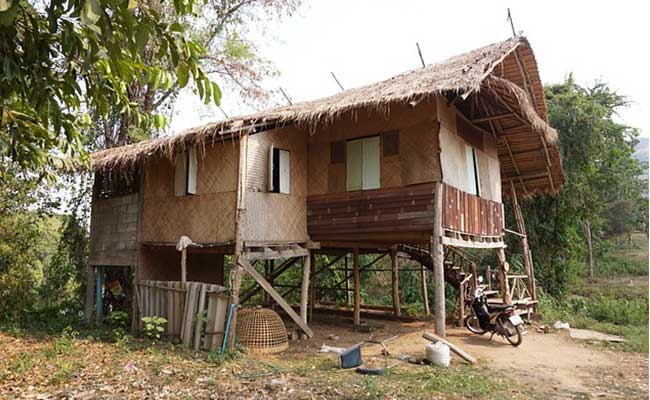If you are considering working long-term in Thailand, or you possess substantial savings or assets, you might be exploring the possibilities of obtaining a personal loan or mortgage.
If your goal is to purchase a home, a mortgage could be the ideal option to secure financing. On the other hand, if you plan to renovate your existing house or acquire a car and require financial assistance, a personal loan may be more suitable.
The good news, or not, depending on how you feel about borrowing money, is that in a bid to promote economic growth, financial institutions in Thailand have increased access to loans for foreigners.
However, as you can imagine, the loan conditions are fairly strict.

As a foreign national, you can get a mortgage on your dream home, or a loan to renovate.
How to Get a Loan in Thailand
Here is a list of the standard requirements for a foreigner wanting to loan money from the bank. Bear in mind that some banks may have additional requirements:
- Work Permit or Thai Resident Permit: Foreigners must possess a valid one-year work permit or a Thai resident permit.
- Proof of Employment and Salary: Applicants need to provide proof of employment in Thailand, including payslips, and demonstrate their annual salary.
- Employer's Company Documents: In some cases, banks may require additional documentation from the applicant's employer.
- Credit Check: Banks conduct credit checks to assess the applicant's creditworthiness.
- Age Limit: The applicant's age combined with the loan period must not exceed 60 years.
- Stable Employment: Having a stable and secure job is crucial for loan approval.
- Income Requirement: The total income of the applicant must be at least three times higher than each installment.
- Loan Duration: The aggregate amortization period for the loan must exceed seven years for some banks. *
* The aggregate amortization period refers to the total duration over which the loan is scheduled to be repaid. It represents the length of time it will take for the borrower to fully repay the loan, including both the principal amount borrowed and any accrued interest. This requirement ensures that the loan repayment is spread out over a reasonable period, allowing borrowers to manage their repayments effectively.
To apply for a bank loan, applicants typically need to submit the following documents:
- Passport copies, including the visa page, identification card, or government office identification card
- Marriage certificate (if applicable)
- Confirmation of income or salary, along with bank statements
- Copies of land or unit title deeds, sale and purchase contracts
Interest Rates
As of June 2023, the Monetary Policy Committee of the Bank of Thailand (BoT) set the interest rate at 2.00%.
However, interest on deposits remains much lower, and interest on loans much higher. Here are some examples from Bangkok Bank.
Deposit Rates:
- Savings Deposits: 0.60% per annum
- 3-Month Fixed Deposits: 0.95% per annum
- 6-Month Fixed Deposits: 1.05% per annum
- 12-Month Fixed Deposits: 1.35% per annum
- 24-Month Fixed Deposits: 1.75% per annum
- 36-Month Fixed Deposits: 1.90% per annum
- e-Savings Deposits (up to 1 million baht): 1.50% per annum
- e-Savings Deposits (above 1 million baht): 0.60% per annum
Loan Interest Rates:
- Minimum Loan Rate (MLR) for prime customers with specific loan duration: 6.85% per annum
- Minimum Overdraft Rate (MOR) for prime customers with overdraft facilities: 7.30% per annum
- Minimum Retail Rate (MRR) for retail clients with good credit history: 7.05% per annum
Please note that these rates are subject to change and may vary depending on specific terms, conditions, and customer profiles. It is advisable to contact the relevant financial institution directly for the most up-to-date information regarding deposit and loan interest rates.
How to Get a Mortgage (as a foreigner) in Thailand
A mortgage is a legal agreement between a borrower and a lender, typically a bank or financial institution, where the borrower obtains financing to purchase a property.
In a mortgage agreement, the borrower (referred to as the mortgagor) pledges the property being purchased or an existing property as collateral to secure the loan. This collateral serves as security for the lender (referred to as the mortgagee) in case the borrower fails to repay the loan as agreed.
Once the mortgage is fully repaid, the borrower gains full ownership of the property. Until then, the lender holds a lien on the property, which means they have a legal claim to it until the loan is paid off.
In Thailand, mortgages are regulated under the Thai Civil and Commercial Code.
In addition to real estate, the following types of immovables can be mortgaged if they are registered according to the law:
- Ships weighing five tons or more
- Floating houses
- Beasts of burden (e.g., elephants, donkeys, horses)
- Other movable assets as provided by specific laws
To qualify for protection under Thai law, foreigners seeking a mortgage must meet the following criteria:
- Right of Ownership: The mortgagor must have the legal right of ownership over the property.
- Written and Registered Contract: The mortgage contract must be in writing and registered according to the specific requirements based on the type of property:
- Land with a title deed: Register at the Department of Lands, Bangkok Metropolis Land Office (Branch), or Provincial Land Office.
- Land without a title deed: Register at the District Office where the land is located.
It's important to note that further details and requirements may vary depending on the specific circumstances and the policies of individual banks or financial institutions.
International Home Loan Schemes
Additionally, foreigners may explore international home loan schemes provided by Bangkok Bank's Singapore branch and UOB.
The international home loan schemes provided by Bangkok Bank's Singapore branch and UOB are specifically designed for foreigners or Thai nationals residing outside of Thailand who are interested in purchasing property within Thailand.
These schemes cater to individuals who may not have access to local financing options or find it more convenient to secure a loan through an international bank branch.
These international home loan schemes offer the following features:
- Financing for Foreigners: These schemes provide funding to non-residents of Thailand, allowing them to access the necessary funds to purchase a property in Thailand.
- Flexible Loan Amount: Borrowers can typically secure loans for a substantial portion of the property value, depending on the specific terms and conditions of the scheme.
- Competitive Interest Rates: The interest rates offered under these schemes are usually competitive, aiming to attract international borrowers.
- Extended Loan Tenure: The repayment period for international home loans is often more extended compared to local loan options, offering borrowers greater flexibility in managing their repayments.
- Streamlined Application Process: The application process for these schemes is designed to be efficient and convenient for borrowers living overseas. The banks usually have dedicated teams or representatives who assist borrowers throughout the loan application process.
In Summary
Taking out a loan or mortgage in Thailand is pretty much the same as it would be back in your home country, though you may find the interest rates offered are higher. I was surprised at how accessible it is.
While loans are commonplace, it has to be noted that taking on debt increases your financial obligations and limits your flexibility. Additionally, loans and mortgages come with interest payments, which can significantly inflate the total cost of borrowing.
The burden of debt can lead to financial stress and strain, especially if you're already facing challenges. Defaulting on payments can have severe consequences, including damage to your credit score and potential legal actions.
Conversely, though, if money is cheap to borrow, it can be advantageous to your financial situation.
It really does depend on your situation. Renting of property and vehicles in Thailand is relatively cheap and hassle free, and means you can up and leave anytime you want. On the other hand, if you have children, you may want to leave them a property when you pass, for which you might need a loan to buy.
——
Have you secured a personal loan or mortgage in Thailand? Let me know what the process was like in the comments section below.
Disclaimer:
The information provided in this article is for general informational purposes only and does not constitute financial advice. While efforts have been made to ensure the accuracy and reliability of the information, it should not be relied upon as a substitute for professional financial advice tailored to your specific circumstances. Every individual's financial situation is unique, and the appropriateness of any financial decision can vary based on personal factors. Before making any financial decisions or taking action, it is recommended to consult with a qualified financial advisor or professional who can provide personalized guidance based on your individual needs and objectives.
More Info on Financial Planning
Need help with pension, savings or investment planning?
+ Connect with my trusted personal IFA using this form
Need to send money to Thailand?
+ Go here to find out the cheapest way. Everyone is using this
Got Medical Insurance?
+ You should have. Get a quote on international cover here.
Last Updated on


![Thailand's New Expat Income Tax Policy [Fact Checked by Experts] tax-expat-thailand](https://www.thethailandlife.com/wp-content/uploads/2023/10/tax-expat-thailand-150x150.jpg)
Jasmin says
Jeg vil gerne overfører pengene til min konto kort i Thailand sådan så jeg kan spar penge indtil jeg beslutter mig for at rejse til Thailand og bo der fast.. Mvh. Jasmin yassine
Jul 18, 2023 at 4:14 pm